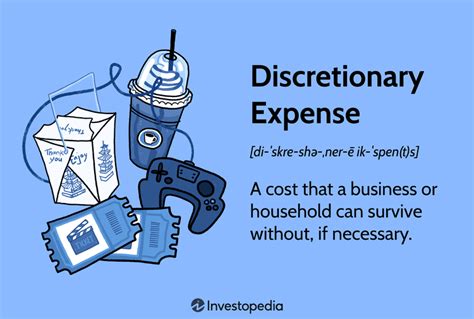Discretionary Spending Definition
Discretionary spending refers to government expenditures that are not mandated by law or entitlement programs. Unlike mandatory spending, which is predetermined and allocated automatically, discretionary spending provides flexibility to the government in allocating funds to various sectors and programs.

Role of Discretionary Spending in Government
Discretionary spending plays a crucial role in shaping government priorities and addressing specific policy goals. It allows policymakers to:
- Fund new initiatives and programs: Discretionary spending enables the government to invest in novel ideas, explore emerging trends, and address new societal challenges.
- Provide funding for critical services: Discretionary funds support essential services such as education, healthcare, infrastructure, national security, and environmental protection.
- Adjust spending levels: The ability to adjust discretionary spending levels allows the government to respond to economic fluctuations, emergencies, or changing priorities.
Process for Allocating Discretionary Spending
The allocation of discretionary spending typically undergoes a rigorous process involving:
- Presidential Budget Proposal: The President submits a budget proposal to Congress, outlining the proposed allocation of discretionary funds for the upcoming fiscal year.
- Congressional Review and Approval: Congress reviews the proposed budget, scrutinizes agency requests, and debates spending priorities.
- Appropriations Process: Congress passes a series of appropriations bills, each allocating funds to specific government agencies and programs.
- Presidential Signature: The President signs the appropriations bills into law, authorizing the release of discretionary funds.
Examples of Discretionary Spending
Examples of discretionary spending include:
- Research and development grants
- Infrastructure projects (e.g., roads, bridges, airports)
- Defense programs
- Foreign aid
- Education initiatives
- Environmental protection programs
Importance of Discretionary Spending
Discretionary spending serves as a vital tool for government governance by:
- Addressing societal needs: It allows the government to respond to emerging challenges and invest in programs that improve the lives of citizens.
- Stimulating economic growth: Targeted discretionary spending can encourage innovation, job creation, and infrastructure development.
- Enhancing national security: It provides funding for military preparedness, diplomacy, and counterterrorism measures.
- Promoting social equity: Discretionary spending can support initiatives that address inequalities, promote access to healthcare and education, and provide safety nets.
Challenges Associated with Discretionary Spending
Discretionary spending faces several challenges, including:
- Political influences: The allocation process can be influenced by political considerations and lobbying efforts.
- Budget constraints: Government debt and economic conditions may limit the availability of discretionary funds.
- Monitoring and evaluation: Ensuring effective use of discretionary funds requires robust monitoring and evaluation mechanisms.
Benefits of Discretionary Spending
Discretionary spending offers numerous benefits, such as:
- Flexibility: It allows the government to respond to evolving priorities and address unforeseen needs.
- Innovation: It encourages experimentation and the funding of novel programs that may lead to long-term benefits.
- Economic multipliers: Targeted discretionary spending can stimulate economic activity by creating jobs and supporting businesses.
- Improved public services: It enhances the quality and accessibility of essential government services.
Conclusion
Discretionary spending occupies a significant role in the government’s fiscal framework, providing flexibility in allocating funds to address societal needs and policy priorities. The process of allocating discretionary spending involves presidential proposals, congressional review, appropriations, and presidential approval.
Understanding discretionary spending is crucial for comprehending government governance, economic policies, and the provision of essential services. By leveraging its flexibility and benefits, the government can effectively address challenges, promote innovation, and enhance the well-being of its citizens.
Frequently Asked Questions (FAQs)
-
What is the difference between discretionary and mandatory spending?
– Discretionary spending is not mandated by law or entitlement programs, while mandatory spending is automatically allocated to established programs such as Social Security and Medicare. -
Who controls discretionary spending?
– Congress has the authority to approve the allocation of discretionary spending through the appropriations process. -
Can discretionary spending be used for any purpose?
– No, discretionary spending must align with the government’s constitutional responsibilities and policy goals. -
How is discretionary spending monitored?
– Government agencies are responsible for monitoring the use of discretionary funds and reporting on their performance. -
What are the major categories of discretionary spending?
– Major categories include defense, education, healthcare, infrastructure, and environmental protection. -
How does discretionary spending impact the economy?
– Targeted discretionary spending can stimulate economic growth by creating jobs and supporting businesses. -
What are the potential drawbacks of discretionary spending?
– It may be subject to political influence and budget constraints, and effective use requires robust monitoring and evaluation. -
How can discretionary spending be used to address societal challenges?
– Discretionary funds can be allocated to programs that address inequality, promote access to healthcare and education, and strengthen national security.
